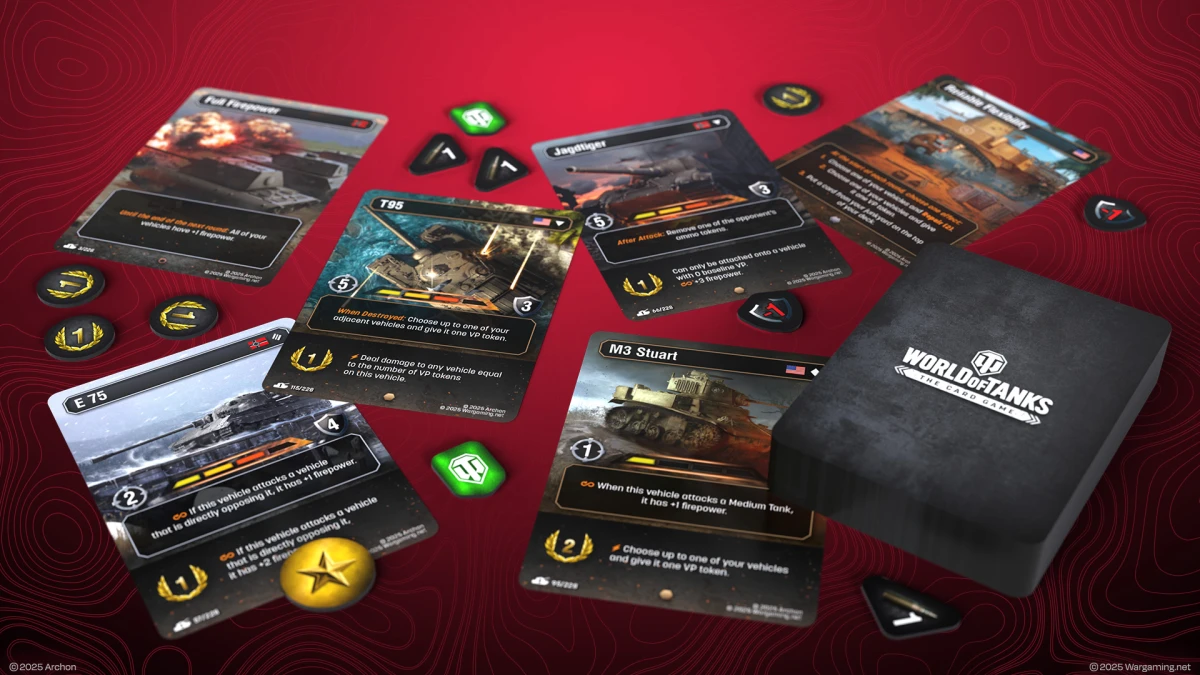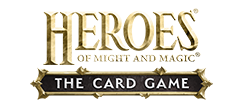- Brands
-
Shop
-
Dungeons & Lasers
-
Rampart
-
Masters of The Universe: Battleground
-
Masters of The Universe: Fields of Eternia
-
Heroes of Might & Magic III: The Board Game
-
World of Tanks: The Card Game
-
StarCraft Tabletop Miniatures Game
-
Trench Crusade
-
Starfinder
-
- Newest
- Bestsellers
- Pre-orders
TCG vs ECG: What’s the Difference? Featuring “Heroes of Might & Magic” and “World of Tanks”
Posted on Tuesday,
24.06.2025
By Aleksandra Adamczyk
Selected language
EN
- DE
- ES
- FR
- PL

Card games are wonderful. Whether you want to spend some time with a friend, get rid of the awkward atmosphere at a party or simply play something accessible with your children, card games have always been a go-to for many, many years. However, with tabletop card games on the rise again, both new and veteran players are often faced with one critical question: What’s the difference between a Trading Card Game (TCG) and an Expandable Card Game (ECG)? Whether you're here out of curiosity or considering which format fits your playstyle, this article will break down the key differences—featuring two of our most exciting upcoming titles: Heroes of Might and Magic: The Card Game and World of Tanks: The Card Game as real-life examples.
Table of Contents
- What is a TCG (Trading Card Game) and how does it work?
- What is an ECG (Expandable Card Game) and how does it work?
- TCG vs ECG: Which Format Is Right for You?
- Final Summary: Two Formats, Endless Possibilities
First, let’s break down what TCG and ECG actually mean.
What Is a TCG (Trading Card Game) and how does it work?
A Trading Card Game, also known as a Collectible Card Game (CCG), is a format that focuses on collectibility, enables deck-building freedom, and offers randomized packs with cards. That is usually the most appealing feature to people—because in a TCG, players acquire cards through starter decks and booster packs, which contain a random assortment of cards. Some are common, some are rare, and there’s always an element of surprise. Usually, players have minimal to no certainty about what they will find in a pack. They can trade (hence the name) with each other to exchange cards that they don't like, and for rarer cards, they can even hope to monetize and sell them to willing buyers. These types of games usually have a very dynamic playthrough meta, which sometimes focuses on the most recent pack releases. And don’t forget - the excitement while opening a new pack is irreplaceable!
Key Features:
- Booster packs with random cards
- Active secondary market and trading
- Ever-evolving game meta
- Strong replayability through deck experimentation
Heavy-duty TCG - World of Tanks: The Card Game
A perfect real-life example of such a format would be our recently announced and upcoming World of Tanks: The Card Game. Fast-paced, intense, and strategic: World of Tanks: The Card Game transfers the thrill from battlefield into a competitive TCG format. In this game, you'll be able to create your own squadron, position tanks, and participate in strategic battles—all based on a system that focuses on replay value and ease of learning. It’s a perfect game for TCG lovers and also avid fans of the known franchise, as it will be fairly easy to pick up, even for beginners! If you're looking for the best trading card game for strategy players, this title offers great tactical depth. Not to mention - who doesn’t like collecting tanks?
What you can expect:
- Highly collectible WWII tank cards and bases
- Booster pack structure that enhances variety and competitiveness
- Strategic combos and engaging gameplay
Stay up to date and sign up for the World of Tanks: TCG newsletter here: World of Tanks: The Card Game

We’ve shared with you our newest TCG, but how exactly does TCG differ from a seemingly similar “expandable” card game (ECG)? The differences might surprise you, and there are quite a lot of them!
What Is an ECG (Expandable Card Game) and how does it work?
An Expandable Card Game (sometimes called a Living Card Game) offers fixed expansions instead of randomized boosters. Every player who buys an expansion gets the same set of cards—there are no surprises here! This format appeals to players who prefer predictability, balanced play, and narrative-driven experiences. It can also be cost-effective, as prices of available cards usually remain stable due to wide availability of the cards. The meta play for this type of card games is still interesting, as players can mix and match their deck as they please, which also means these kinds of games tend to be more balanced. Usually, in TCGs higher rarity cards also have stronger properties in play—in order to give players an incentive to actively look for them. In an ECG, there is no such thing as spending a lot of money to get the most powerful cards, so this format tends to be more budget-friendly. Despite that, ECG games are still dynamic and interesting - with the release of new expansion packs, players can experience meta shifts, game novelty, and new content, just like in TCG games.
Key Features:
- Fixed, non-random expansions
- Easier on the wallet and more accessible
- Focus on fairness and completeness
- Often suited for cooperative or campaign play
Magical and Strategic ECG - Heroes of Might and Magic: The Card Game
One notable expandable card game example is our second upcoming title that we announced earlier this year - Heroes of Might and Magic: The Card Game. This card game is deeply rooted in the beloved HoMM universe—and built from the ground up as an ECG. Players collect cards representing powerful Heroes, mystical spells, mythical creatures, and legendary artifacts to build unique decks tailored to their faction and strategy. The game will feature multiple expansions in the future, so the gameplay will stay dynamic, engaging, and fun. Some legendary heroes and creatures from this iconic universe will receive premium-looking cards with glorious effects!
What you can expect:
- The HoMM universe is rich in design variety—ideal for a high-end ECG
- Deck diversity reflects strategic gameplay from the original games
- Themed packs create excitement and are inviting for expandable card game lovers
Make sure you don’t miss this iconic ECG and follow our Gamefound campaign!: Heroes of Might and Magic: The Card Game

TCG vs ECG: Which Format Is Right for You?
So, how to choose between TCG and ECG based on your playstyle? At this stage we know what are Tradeable Card Games, we also know what are Expandable Card Games - now, let’s compare the TCG and ECG features side-by-side! You can take a look at these feature comparisons and decide which game type is right for you.
Card Acquisition
TCG: Comes in random booster packs — the thrill of opening unknown cards.
ECG: Uses fixed expansion packs, so you know exactly what you’re getting.
Deckbuilding Potential
TCG: Offers deep customization and ever-changing metas.
ECG: More balanced but with limited options for deck construction.
Collectibility
TCG: A strong focus on rare cards and trading culture.
ECG: Minimal collectibility; gameplay is prioritized over card rarity.
Budget Control
TCG: Costs can vary widely and become expensive over time.
ECG: Predictable pricing makes it easier to budget.
Game Style
TCG: Competitive and varied—ideal for tournaments and ranked play.
ECG: Often cooperative or story-driven, better for immersive experiences.
Final Summary: Two Formats, Endless Possibilities
Both Trading Card Games (TCGs) and Expandable Card Games (ECGs) offer unique strengths that appeal to different kinds of players. TCGs bring excitement for the unknown, collectibility, and evolving metas through booster packs and trading. ECGs, on the other hand, focus on predictability, balance, and accessibility through fixed expansions.
At Archon Studio, we’re proud to be stepping into the world of card games with both formats in mind—and even more in the future. No matter if you're looking forward to the WWII-infused competition of World of Tanks: The Card Game, or the strategic, fantasy universe of Heroes of Might and Magic: The Card Game... or even a little bit of both! We're strongly committed to delivering engaging gameplay and support for both communities.
As the card game space continues to grow, we grow with you. Looking to explore new systems, galaxies or even hand-to-hand combat—we will keep bringing you more and more titles in the future.
Collect, battle, and have fun!









